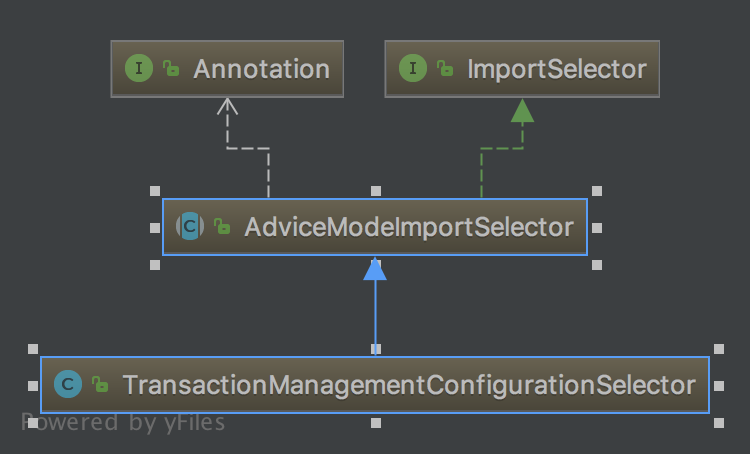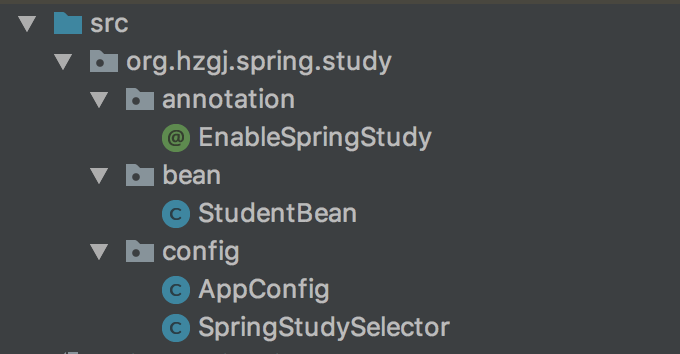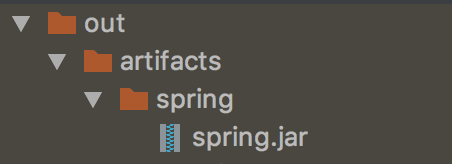ImportSelector接口是至spring中导入外部配置的核心接口,在SpringBoot的自动化配置和@EnableXXX(功能性注解)都有它的存在,关于SpringBoot的分析可以参考:深入理解SpringBoot的自动装配。
一、关于ImportSelector接口
package org.springframework.context.annotation; import org.springframework.core.type.AnnotationMetadata; /** * Interface to be implemented by types that determine which @{@link Configuration} * class(es) should be imported based on a given selection criteria, usually one or more * annotation attributes. * * <p>An {@link ImportSelector} may implement any of the following * {@link org.springframework.beans.factory.Aware Aware} interfaces, and their respective * methods will be called prior to {@link #selectImports}: * <ul> * <li>{@link org.springframework.context.EnvironmentAware EnvironmentAware}</li> * <li>{@link org.springframework.beans.factory.BeanFactoryAware BeanFactoryAware}</li> * <li>{@link org.springframework.beans.factory.BeanClassLoaderAware BeanClassLoaderAware}</li> * <li>{@link org.springframework.context.ResourceLoaderAware ResourceLoaderAware}</li> * </ul> * * <p>ImportSelectors are usually processed in the same way as regular {@code @Import} * annotations, however, it is also possible to defer selection of imports until all * {@code @Configuration} classes have been processed (see {@link DeferredImportSelector} * for details). * * @author Chris Beams * @since 3.1 * @see DeferredImportSelector * @see Import * @see ImportBeanDefinitionRegistrar * @see Configuration */ public interface ImportSelector { /** * Select and return the names of which class(es) should be imported based on * the {@link AnnotationMetadata} of the importing @{@link Configuration} class. */ String[] selectImports(AnnotationMetadata importingClassMetadata); }
该接口文档上说的明明白白,其主要作用是收集需要导入的配置类,如果该接口的实现类同时实现EnvironmentAware, BeanFactoryAware ,BeanClassLoaderAware或者ResourceLoaderAware,那么在调用其selectImports方法之前先调用上述接口中对应的方法,如果需要在所有的@Configuration处理完在导入时可以实现DeferredImportSelector接口。
在这里我举个Spring中的实例来看一下:
@Target(ElementType.TYPE) @Retention(RetentionPolicy.RUNTIME) @Documented @Import(TransactionManagementConfigurationSelector.class) public @interface EnableTransactionManagement { /** * Indicate whether subclass-based (CGLIB) proxies are to be created ({@code true}) as * opposed to standard Java interface-based proxies ({@code false}). The default is * {@code false}. <strong>Applicable only if {@link #mode()} is set to * {@link AdviceMode#PROXY}</strong>. * <p>Note that setting this attribute to {@code true} will affect <em>all</em> * Spring-managed beans requiring proxying, not just those marked with * {@code @Transactional}. For example, other beans marked with Spring's * {@code @Async} annotation will be upgraded to subclass proxying at the same * time. This approach has no negative impact in practice unless one is explicitly * expecting one type of proxy vs another, e.g. in tests. */ boolean proxyTargetClass() default false; /** * Indicate how transactional advice should be applied. The default is * {@link AdviceMode#PROXY}. * @see AdviceMode */ AdviceMode mode() default AdviceMode.PROXY; /** * Indicate the ordering of the execution of the transaction advisor * when multiple advices are applied at a specific joinpoint. * The default is {@link Ordered#LOWEST_PRECEDENCE}. */ int order() default Ordered.LOWEST_PRECEDENCE; }
此注解是开启声明式事务的注解,那么它的@Import所导入的类为TransactionManagementConfigurationSelector,那么我们看一下其类图:

由此可知该类实现类ImportSelector接口
二、自定义@EnableXXX注解
在这里我们先准备两个Spring的项目工程:spring-project与ssm-project,其中spring-project里我们先创建好如下结构目录:

SpringStudySelector
package org.hzgj.spring.study.config; import org.springframework.beans.BeansException; import org.springframework.beans.factory.BeanFactory; import org.springframework.beans.factory.BeanFactoryAware; import org.springframework.context.annotation.ImportSelector; import org.springframework.core.type.AnnotationMetadata; public class SpringStudySelector implements ImportSelector, BeanFactoryAware { private BeanFactory beanFactory; @Override public String[] selectImports(AnnotationMetadata importingClassMetadata) { importingClassMetadata.getAnnotationTypes().forEach(System.out::println); System.out.println(beanFactory); return new String[]{AppConfig.class.getName()}; } @Override public void setBeanFactory(BeanFactory beanFactory) throws BeansException { this.beanFactory = beanFactory; } }
在这里我们实现ImportSelector接口和BeanFactoryAware接口,重写selectImports方法,最后我们返回的是AppConfig的类名,同时打印出相关的注解元数据与BeanFactory
自定义@EnableSpringStudy注解
package org.hzgj.spring.study.annotation; import org.hzgj.spring.study.config.SpringStudySelector; import org.springframework.context.annotation.Import; import java.lang.annotation.*; @Retention(RetentionPolicy.RUNTIME) @Documented @Target(ElementType.TYPE) @Import(SpringStudySelector.class) public @interface EnableSpringStudy { }
在这里我们仿照@EnableTransactionManagement来实现自定义注解,注意使用@Import导入我们刚才写的SpringStudySelector
AppConfig
package org.hzgj.spring.study.config; import org.hzgj.spring.study.bean.StudentBean; import org.springframework.context.annotation.Bean; import org.springframework.context.annotation.Configuration; @Configuration public class AppConfig { @Bean public StudentBean studentBean() { StudentBean studentBean = new StudentBean(); studentBean.setId(19); studentBean.setName("admin"); return studentBean; } }
当都完成以后我们打个jar包,准备引入至其他工程:

完成ssm-project工程中的AppConfig配置类
1) 首先我们将刚才的spring.jar导入到ssm-project工程里
2) 在对应的配置类上添加上spring-project中定义的@EnableSpringStudy注解
@Configuration //表明此类是配置类 @ComponentScan // 扫描自定义的组件(repository service component controller) @PropertySource("classpath:application.properties") // 读取application.properties @MapperScan("com.bdqn.lyrk.ssm.study.app.mapper") //扫描Mybatis的Mapper接口 @EnableTransactionManagement //开启事务管理 @EnableSpringStudy public class AppConfig { //....省略配置代码 }
3)编写Main方法
public static void main(String[] args) throws IOException { AnnotationConfigApplicationContext applicationContext = new AnnotationConfigApplicationContext(AppConfig.class); StudentBean studentBean = applicationContext.getBean(StudentBean.class); System.out.println(studentBean.getName()); }
运行后输出结果:
org.springframework.context.annotation.Configuration org.springframework.context.annotation.ComponentScan org.springframework.context.annotation.PropertySource org.mybatis.spring.annotation.MapperScan org.springframework.transaction.annotation.EnableTransactionManagement org.hzgj.spring.study.annotation.EnableSpringStudy org.springframework.beans.factory.support.DefaultListableBeanFactory@4b9e13df: defining beans [org.springframework.context.annotation.internalConfigurationAnnotationProcessor,org.springframework.context.annotation.internalAutowiredAnnotationProcessor,org.springframework.context.annotation.internalRequiredAnnotationProcessor,org.springframework.context.annotation.internalCommonAnnotationProcessor,org.springframework.context.event.internalEventListenerProcessor,org.springframework.context.event.internalEventListenerFactory,appConfig,propertiesConfig,logAspect,studentService]; root of factory hierarchy admin
从这里我们可以看到ImportSelector接口中的方法参数,可以获取ssm-project项目下AppConfig的所有注解,并且能够获取当前BeanFactory所有配置的Bean
三、ImportSelector源码分析
这个接口在哪里调用呢?我们可以来看一下ConfigurationClassParser这个类的processImports方法
private void processImports(ConfigurationClass configClass, SourceClass currentSourceClass, Collection<SourceClass> importCandidates, boolean checkForCircularImports) { if (importCandidates.isEmpty()) { return; } if (checkForCircularImports && isChainedImportOnStack(configClass)) { this.problemReporter.error(new CircularImportProblem(configClass, this.importStack)); } else { this.importStack.push(configClass); try { for (SourceClass candidate : importCandidates) {
//对ImportSelector的处理 if (candidate.isAssignable(ImportSelector.class)) { // Candidate class is an ImportSelector -> delegate to it to determine imports Class<?> candidateClass = candidate.loadClass(); ImportSelector selector = BeanUtils.instantiateClass(candidateClass, ImportSelector.class); ParserStrategyUtils.invokeAwareMethods( selector, this.environment, this.resourceLoader, this.registry); if (this.deferredImportSelectors != null && selector instanceof DeferredImportSelector) {
//如果为延迟导入处理则加入集合当中 this.deferredImportSelectors.add( new DeferredImportSelectorHolder(configClass, (DeferredImportSelector) selector)); } else {
//根据ImportSelector方法的返回值来进行递归操作 String[] importClassNames = selector.selectImports(currentSourceClass.getMetadata()); Collection<SourceClass> importSourceClasses = asSourceClasses(importClassNames); processImports(configClass, currentSourceClass, importSourceClasses, false); } } else if (candidate.isAssignable(ImportBeanDefinitionRegistrar.class)) { // Candidate class is an ImportBeanDefinitionRegistrar -> // delegate to it to register additional bean definitions Class<?> candidateClass = candidate.loadClass(); ImportBeanDefinitionRegistrar registrar = BeanUtils.instantiateClass(candidateClass, ImportBeanDefinitionRegistrar.class); ParserStrategyUtils.invokeAwareMethods( registrar, this.environment, this.resourceLoader, this.registry); configClass.addImportBeanDefinitionRegistrar(registrar, currentSourceClass.getMetadata()); } else {
// 如果当前的类既不是ImportSelector也不是ImportBeanDefinitionRegistar就进行@Configuration的解析处理 // Candidate class not an ImportSelector or ImportBeanDefinitionRegistrar -> // process it as an @Configuration class this.importStack.registerImport( currentSourceClass.getMetadata(), candidate.getMetadata().getClassName()); processConfigurationClass(candidate.asConfigClass(configClass)); } } } catch (BeanDefinitionStoreException ex) { throw ex; } catch (Throwable ex) { throw new BeanDefinitionStoreException( "Failed to process import candidates for configuration class [" + configClass.getMetadata().getClassName() + "]", ex); } finally { this.importStack.pop(); } } }
在这里我们可以看到ImportSelector接口的返回值会递归进行解析,把解析到的类全名按照@Configuration进行处理